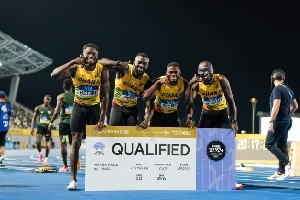- Boxing
- Athletics
- Basketball
- Bodybuilding
- Cricket
- Golf
- Handball
- Hockey
- Martial Arts
- Tennis
- Volleyball
- Other Sports

Sports News of Monday, 12 May 2025
Source: www.ghanawebbers.com
Fix Baton Exchange Error Now- Naa Kwaamah Siaw-Marfo writes
Ghana’s 4x100m relay team struggles with baton exchanges. This ongoing issue has cost the country at major tournaments, including the Olympics and World Championships. Despite having fast sprinters, poor baton handoffs often lead to early elimination.
At the 2022 Commonwealth Games in Birmingham, the team failed to finish their heat due to a bad exchange between legs two and three. In 2019, at the World Athletics Championships in Doha, another faulty exchange resulted in disqualification. The same problem occurred at the 2023 African Games in Accra, ending Ghana's medal hopes in front of a home crowd.
Last year, during the 2024 Paris Olympics, Ghana’s relay team recorded a time of 38.62 seconds but was disqualified for a baton exchange infringement. The issue reappeared during qualification for the 2025 World Championships at the World Relays in Guangzhou on May 11, 2025. Although Ghana qualified for the championships in Tokyo this September, they struggled again with baton transitions.
The current team—Barnabas Aggerh, Joseph Paul Amoah, Mustapha Bokpin, and Ibrahim Fuseini—achieved a season-best time but faced more baton issues. Success in relays requires more than just fast runners; smooth baton changes are crucial. A clean exchange saves time while a poor one can ruin everything.
Countries like the U.S. and Jamaica excel at this because they focus on strategy and technique. Their training regimens emphasize perfecting baton exchanges alongside speed development. They also maintain consistent relay teams to build chemistry among runners.
Now is the time for Ghana's Ministry of Sports and Recreation to take action. Our athletes need structured relay programs and dedicated coaching rather than just encouragement. Regular international exposure is essential if we want to stop making headlines for negative reasons.
Simply picking our four fastest athletes is no longer enough. Ghana needs a long-term plan that fosters cohesion within relay teams from grassroots levels up. The repeated errors stem from inadequate preparation and support rather than lack of talent.
It’s crucial for Ghana to address these issues once and for all. We cannot afford to lose medals over recurring mistakes. With proper systems in place, our relay teams can achieve their full potential on the world stage—but first, we must fix our baton exchanges. How many chances will we waste before change happens?











